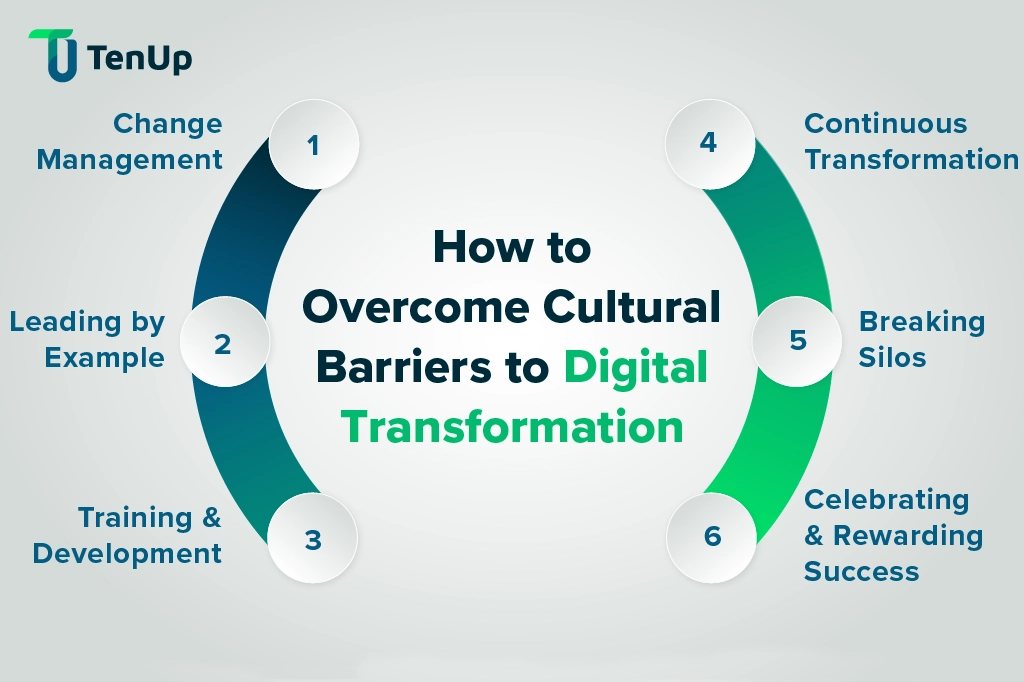5 Key Challenges in Digital Transformation
Cultural challenges to digital transformation are the organizational attitudes, behaviors, and norms that can impede the adoption and implementation of digital technologies. These barriers often come from a deep-seated resistance to change, a fear of the unknown, or quite simply a lack of alignment with the new digital direction. However, for a smooth and effective digital transformation initiative, each organization must have a strategy to understand and overcome the digital transformation challenges in culture. Let’s take a deeper look:
Fear of Change: Change, though essential for progress, is met with resistance in many organizations. Employees may be attached to traditional ways of working and reluctant to embrace digital technologies, often due to fear of failure or an unwillingness to learn. This reluctance can be a significant barrier to overcoming digital transformation challenges.
Fear of Being Replaced: There is a widespread fear even in digitally savvy organizations of technology replacing human jobs. This leads to an apprehension among employees, causing resistance to any new digital technology or process. This resistance can slow down the implementation and limit the effectiveness of new technologies. Even if new tools, technologies, and processes are introduced, employees who are hesitant to adopt will not leverage their full potential, resulting in underutilization of digital initiatives and a negative impact on the benefits of transformation.
Hierarchy and Communication Gaps: Organizational structures sometimes create a barrier, impeding open communication and collaboration across teams, restricting the exchange of information and innovative ideas. This creates digital transformation challenges by leading to misunderstandings, stifling innovation and creativity, and ultimately causing a loss of productivity.
Lack of Adequate Digital Literacy and Skills: In sectors that are not digital-native, a limited understanding of technologies can hinder the adoption and effective utilization of new systems, tools, and platforms, further compounding the digital transformation challenges.
Organizational Silos and Resistance to Collaboration: One of the more serious effects of organizational silos is that they impact digital transformation by limiting information sharing. The fragmented approach results in a lack of consistency and alignment with the organization's overall digital strategy. When departments work in silos they don’t take the larger picture into consideration, only building solutions that meet the immediate needs. Successful digital transformation demands cross-team collaboration, shared vision, leadership commitment, and a consistent strategy and use of tools to create an integrated, data-driven, and agile culture.
Interested in learning how TenUp can help?
Schedule a free consultation to understand how our technical experts can help kickstart and accelerate your digital transformation journey.
Proven Strategies to Overcome Digital Transformation Challenges in Culture
How can organizations break these cultural barriers? Cultural adoption requires a strategic and comprehensive approach that involves leadership, communication, education, and fostering innovation.

Effective Change Management: Change resistance can significantly derail the progress of transformations. It comes as no surprise that Forrester's Business And Technology Services Survey highlights this as one of the top five frequently encountered obstacles in digital transformation execution. In fact, 21% of global services decision-makers, responsible for supporting their organizations' digital transformation, identified the introduction of new processes and capabilities as one of the foremost challenges they face.
The Role of Leadership: Strong leadership champions digital transformation and nourishes a culture of innovation. This means leading by example and practicing what you preach. Digital transformation starts with the senior management and they must immerse themselves in the transition. Leaders must also address the benefits of digital transformation and alleviate their fears, clarifying the value without using jargon. Often, it is necessary to realign employee roles by understanding their capabilities and allocating tasks based on coding skills, tool proficiency, and task efficiency to overcome digital transformation challenges.
Continuous Training and Development: Companies must invest in comprehensive training programs to improve digital literacy and skills among employees. Instead of using canned training solutions, the learning should be tailored to each employee’s learning style, hiring internal or external resources where needed. Most importantly, continuous evaluation and assessment of the outcomes along with employee feedback helps to refine the implementation of tools and technology.
Digital Transformation is a Continuous Journey: Understand that digital transformation is a continuous journey without a fixed endpoint, aiming to create a more adaptable and innovative organization. Traditional change management falls short in this context, as it often overlooks the need to adjust incentives, reinforcing old habits. Acknowledging that not everyone benefits from transformation and openly addressing downsides is crucial for effective leadership. Changing behaviors requires altering incentives, as routines are reinforced by performance measurements. Overcommunication can be counterproductive; successful transformation leaders prioritize listening and tailored communication. C-suite support alone isn't enough; middle management's role is pivotal. Transformation managers must prioritize trust, honesty, and behavioral change, creating an organizational culture that confidently embraces change for ongoing success in a volatile world.
Breaking Down Silos: Breaking down silos is pivotal for successful digital transformation and overcoming resistance to change within organizations. By promoting collaboration, holistic data management, innovation, and customer-centricity, silo breakdown enables agility, streamlined resource allocation, and efficient change management. This approach empowers employees and unifies strategies, enhancing the overall organizational culture. It promotes adaptability and innovation, essential for embracing digital advancements. As a result, organizations can thrive in an evolving business landscape while overcoming the digital transformation challenges posed by silos.
Celebrating and Rewarding Success: Celebrating and rewarding success in digital transformation is pivotal for overcoming resistance to change by providing positive reinforcement, motivating employees, and shifting the organizational culture toward innovation. These celebrations not only acknowledge hard work but also inspire enthusiasm and engagement, encouraging employees to become advocates for change and share valuable insights. By sustaining momentum, improving collaboration, boosting confidence, and enhancing the organization's reputation, celebrations contribute to a cycle of positive change, attracting talent and fostering an environment where digital transformation thrives.
As organizations work to overcome cultural barriers, addressing legacy systems becomes essential for successful digital transformation. For insights on best practices and common pitfalls in legacy modernization, check out our blog on Legacy Modernization and Migration.
Final Thoughts: Driving Digital Transformation Through Cultural Change
In the race toward digital transformation, culture emerges as a decisive factor that can determine an organization's success or stagnation. Recognizing and addressing cultural barriers is not merely an option; it is a necessity for thriving in the digital age. By understanding the roots of resistance and implementing targeted strategies, organizations can break through cultural barriers. Nurturing a culture of innovation helps them overcome the digital transformation challenges they face. This approach paves the way for a successful digital transformation journey.
As a digital transformation software and services provider, we are committed to partnering with you in navigating these challenges and leveraging technology to drive meaningful and sustainable change. Embrace the power of cultural transformation and embark on a journey that transcends technology, reshaping the very fabric of your organization for a digital future.
Need help to thrive in the digital-first economy?
We specialize in building personalized digital transformation solutions for improved business efficiency while reducing costs.


